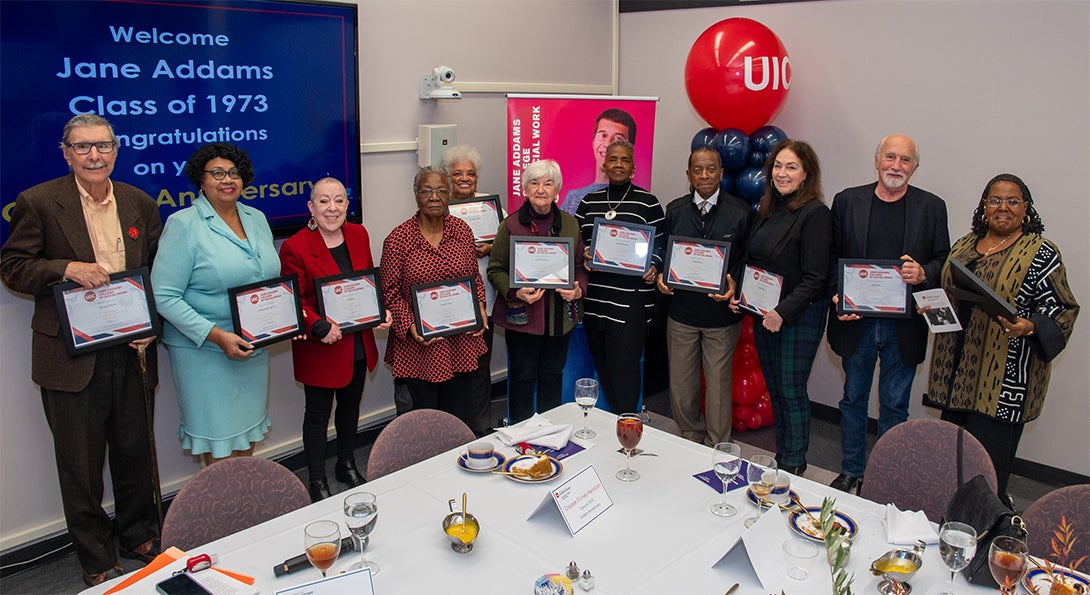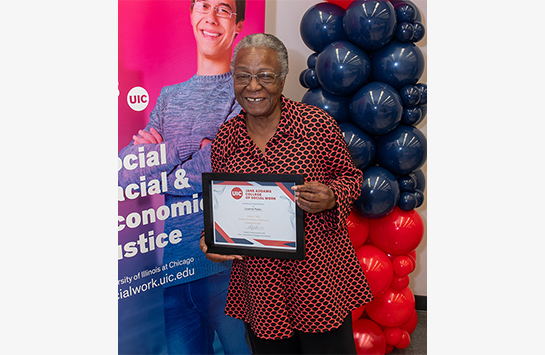The Big 5-0

Class of 1973 Reunite to Share Stories About Their Life After JACSW
Tony Orlando and Dawn’s “Tie a Yellow Ribbon Round the Old Oak Tree” was the number one song in 1973. “The Exorcist”, at $193 million, was the number one grossing movie, and "The Godfather" won Best Picture at the Academy Awards. Former President Lyndon B. Johnson died in 1973, the same year the U.S. ended its involvement in the Vietnam War. And 131 students graduated from the University of Illinois Chicago’s Jane Addams College of Social Work.
The JACSW’s conference room was transformed into an elegant bistro on Nov. 9, 2023, as the Class of 1973 celebrated its 50th anniversary. Attendees dined on a delicious four-course lunch and viewed a special video that encapsulated events from their graduation year. Hosted by Dean Creasie Finney Hairston, alums were presented with gifts to commemorate their special day. Classmates also shared stories about former professors, their courses, and how their lives were impacted by social work.
Story continues

Greg Cahill
After receiving an economics degree from Saint Mary’s College (now University) in Winona, Minn., Cahill served in the U.S. Army from 1968-1970. He returned to Chicago with his wife and young son after his two-year stint and secured a job at the Cook County Department of Public Aid. Witnessing people fighting poverty and discrimination only deepened Cahill’s desire to help people who were less fortunate.
Taking advantage of the GI Bill, which provided financial assistance from the federal government to help returning veterans readjust to civilian life, Cahill decided to pursue a master’s degree in social work. Knowing that he wanted to remain in his hometown of Chicago, Cahill felt the Jane Addams College of Social Work was his best option to continue his education.
Upon his graduation in 1973, Cahill went to work for Alternatives, a non-profit organization that assisted youth become aware of the dangers of drug abuse by creating “alternative” ways to spend time together. Cahill and several teenagers created a coffee house where they performed music with, and for, friends. He also assisted the Chicago Police Department in transporting teenagers who were experiencing psychotic episodes to the hospital instead of jail.
In the 1970s, drugs became almost equal in popularity with alcohol among young people, and working with colleagues, Cahill located chemists to test illicit drugs being sold on the streets for poisons. Alternatives published the information in a weekly newsletter titled “Dope Sheet,” warning teenagers about any dangerous or life-threatening drugs. He also served as chair of the Youth Network Council, whose membership included organizations devoted to youth and runaway programs in the Chicago area that shared information about teenagers in crisis, offering them assistance.
As a youth, Cahill’s house was filled with music. His mother and grandmother were piano teachers, and at the age of four, his grandfather, an accomplished harmonica player, began teaching him how to play the instrument. Four years later he began taking accordion lessons, as did his sister. As their talent grew, they began playing concerts in park districts in Chicago and the suburbs.
Cahill’s musical tastes run the gamut, but when he first heard bluegrass in the 1960s, he was obsessed with the sounds that had roots dating to the 1940s, starting with Bill Monroe’s band, The Blue Grass Boys. After hearing Lester Flatt and Earl Scruggs, the musicians behind “The Ballad of Jed Clampett”, The Beverly Hillbillies theme song, in the 1960s, Cahill took up playing the banjo. And he hasn’t stopped.
While he was fulfilled as a social worker, he couldn’t stop thinking about music; in 1975 he became a fulltime musician. He was a founding member of the bluegrass group, The Special Consensus, and throughout his more than 40 years with the band has toured the world entertaining crowds with his music. While learning the nstrument, Cahill emulated great banjo players – Bela Fleck, Bill Keith, Alan Munde, among others – and today, he is considered one of their contemporaries.
He received the prestigious Distinguished Achievement Award from the International Bluegrass Music Association (IBMA) and was inducted in the Society for the Preservation of Bluegrass Music in America (SPBGMA) Hall of Greats. The Special Consensus has released 21 recordings and received seven awards from the IBMA and two Grammy nominations.
When Cahill received the invitation to attend the college’s 50th reunion, he was immediately transported back to his UIC days.
“It definitely does not seem like it was 50 years ago,” he said. “I have maintained ongoing friendships with a few fellow graduates, and we enjoy getting together to reminisce. We were in the Community Organization and Planning field and our group was small, so we became quite close and very involved in the work to be done in the city of Chicago both in the field and politically. Professor Fred Brown was inspiring and very enthusiastic and supportive of each of us in our various projects, and Professor Ed Marksman was also very inspiring and motivational.
“I enjoyed my time at the Jane Addams College of Social Work, and I received a quality education. Social work is a great field, and while I didn’t make it my entire career, I was thankful for the time I spent in it.”
Story continues

Louanner Peters
Having an interest in community organizing and planning, Louanner Peters felt law school was in her future after graduating with a political science degree from Louisiana State University in 1971. That was until a visiting instructor noticed her class discussions centered on an activist approach to changing systems.
“The instructor suggested I research the Jane Addams College of Social Work because of a new concentration being initiated in the fall of 1971,” Peters said. “I wrote to the college and the information I received really piqued my interest. Jane Addams was the only application I submitted for graduate school.”
The new Community Organization & Planning specialization had a “tremendous impact” on Peters’ professional life. Conducting research and learning the principles and practices of planning and organization were invaluable, she said. But not more so than understanding the difference and mastering the ability to hear rather than listen, and the skill of “assessing the social dynamics” of group gatherings.
Peters spent most of her career in public service upon receiving a master’s degree in social work. She served as chief of staff for U.S. Rep. Gus Savage (D-Ill.) for 10 years, and four years of that time was spent on the staff of the Committee on Public Works & Transportation. A noted political strategist and public policy expert, Peters also served as national director of Voter Empowerment for the National Association for the Advancement of Colored People (NAACP) and was former deputy governor of Illinois under then- Governor Rod Blagojevich. She was the first Black woman to hold that position.
Having been raised on a farm in rural Louisiana, hard work was familiar to Peters. With her social work background, she tirelessly fought for families and children, and individuals that suffered from economic inequities and civil rights injustices. She authored an amendment to the Defense Authorization Bill that was introduced by her boss that eventually became law; she worked on developing and mobilizing support for the implementation of Illinois’ All Kids Program; and developed and mobilized support for the Illinois’ Breast and Cervical Cancer Program that made screening and treatment available to uninsured women prior to the passage of the Affordable Care Act. All her work touched her in some way, but as a bilateral breast cancer survivor, the program was especially meaningful to her.
Peters has fond memories of the Jane Addams College of Social Work, and “I am still in shock from the realization that it has been 50 years,” she said. “I maintained contact with several colleagues that had similar community engagement interests, and Professor Dorothy Young and I remained friends until her passing.
“I had many accomplishments in my career, and social work was at the forefront of my successes.”